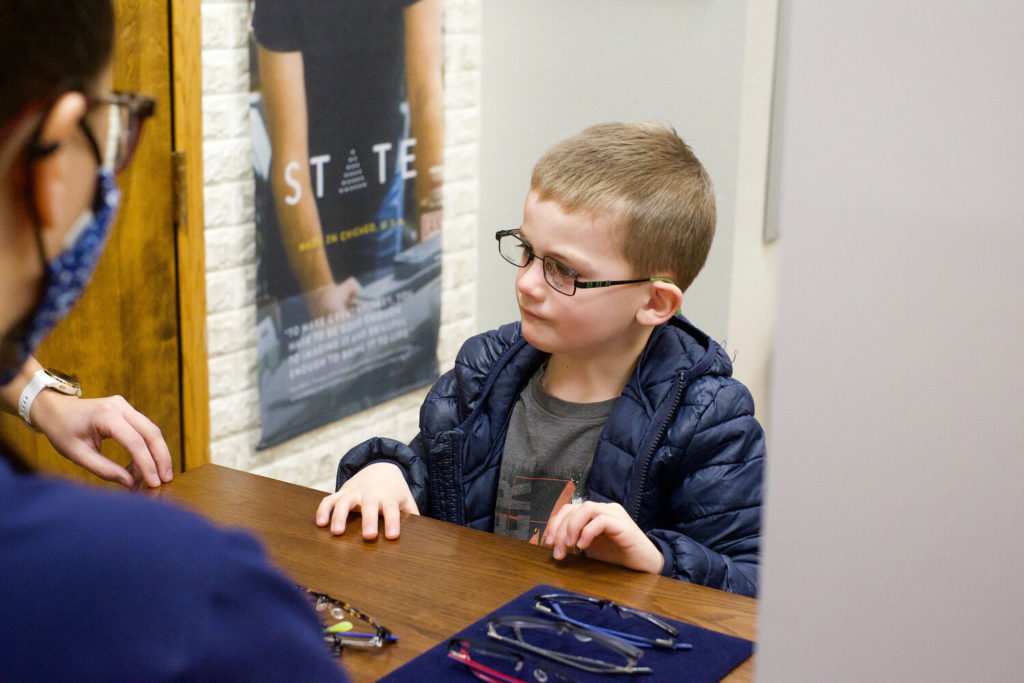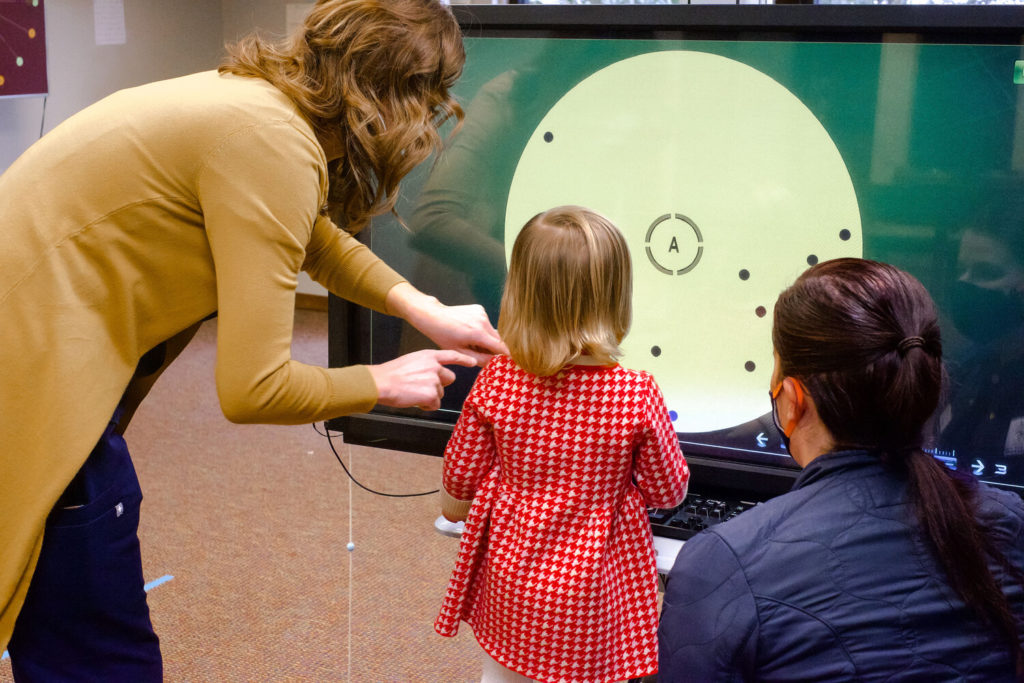
Did you know light moves at a speed of 186,000 miles per hour? That means vision is the fastest thing on the planet. We are asking children to harness the fastest thing on Earth. Let's make sure their vision is clear and comfortable so they are limitless in their development and potential. They should never be held back by their eyes.
You only want the best for your child. We totally get it. We’re a family practice committed to our whole family, including your child. The visual system is a complex system that takes time to develop, and as your child develops and hits developmental milestones, there are also visual milestones that you should be aware of. Vision is paramount to your child’s success, and dealing with any vision problems as soon as they appear is the best way to ensure your child’s long-term vision health.
This is a great question! Your child should have their first eye exam at or around six months old!
Children should have a comprehensive eye exam every year. Period. At Fort Collins Family Eye Care, we make vision exams for children fun! They love our fun lights, eye-brain games, and fitness tests. We even get to see their brain working as we look at their eye health. Eye exams help support your child’s unlimited potential, no matter their age, and they have a blast during them!
As your child’s vision develops, there are certain things that you should watch out for to help detect the earliest signs of vision problems. Schedule a comprehensive vision exam if you notice your child struggling with:
Your child probably doesn’t know they’re suffering from lackluster vision. Why? They don’t know any differently, and they’re already coping with and adapting to it. If this is the case for your child, they are suffering with it, even if they’re not yet consciously aware of it. The most important thing you can do for your child’s vision is to think preventatively for them. Watching for the leading signs of struggle and frustration with their visual skills will help get your child off to the right foot. Catching vision problems before they start is the best way to treat them!
If your child is telling you they are having trouble seeing clearly, having trouble with hand-eye coordination, having trouble reading, or anything else relating to vision, schedule a comprehensive examination. Our suite of advanced technology and Vision Performance Center will give your child the visual skills and treatments that they need to truly succeed.
When your baby is born, the visual system still has a lot of growing up to do. Your baby can only see between eight and ten inches from their face, roughly the distance between the breast and mom’s face. However, you don’t need to wait to make sure your child’s vision is on the right track. There are some very early signs of vision problems to look out for in babies. If you notice any of the following, call Dr. Munson to schedule a comprehensive exam:
Newborn babies should be checked for “Red Reflex” as well as blink and pupil response. A more comprehensive eye exam may be necessary if your baby is born prematurely or you have a family history of childhood eye disease. Some possible issues include infant cataract, glaucoma, or tumors. However, it’s important to know that vision problems in infants are rare. You shouldn’t worry too much unless you notice things like:
If you’re concerned about your baby’s vision, call Dr. Munson right away to schedule a comprehensive pediatric vision exam.
As a newborn, your baby isn’t seeing in color yet. But babies love high contrast! To support your baby’s developing visual system, you can provide lots of high contrast visuals for your baby to focus on!
Another thing you can do is to give your baby lots of floor time! Be it on their back or belly, your child learns a lot on the floor, rolling around and exploring the world. Give your baby plenty of new things to look at, reach for, and explore.
Never underestimate the power of house tours! Carry your baby around the house and narrate where you are and what you’re doing. Count steps, show your baby how faucets and cabinets and light switches work. Your baby will be fascinated (and their little brain and visual system will be growing)!
If you haven’t yet, schedule an eye exam for your infant. The AAO recommends scheduling an eye exam for your infant at at least six months old. If you missed this milestone, it’s not too late! Dr. Munson and her whole team of Wellness Heroes at Fort Collins Family Eye Care are here to help you along your vision journey as your Fort Collins pediatric eye doctor.
Your toddler can certainly see better than an infant, especially as a newborn. However, their vision won’t be fully developed until their teen years. Thus, it’s really important to regularly have your child’s eyes examined by a kid’s eye doctor in Fort Collins. At the very least, your child should be screened regularly to detect signs of vision problems. This can be done at your child’s well visit with their pediatrician, but we recommend scheduling your child a comprehensive eye exam.
You should make sure your child is checked for amblyopia, or lazy eye, because if its not treated early, it can cause more serious vision and potentially learning problems for your child.
Toddlers toddle around. It’s their thing. As exciting as this is and as much as it opens up a whole world of opportunities for your child, it also opens up a world of potential accidents (we know you’re keenly aware of this fact).
We know you’ve babyproofed. Harmful chemicals are a serious danger to your child’s health and vision.
Don’t forget to protect sharp corners! Toddlers fall. And a fall into a sharp corner can cause serious trauma to your child’s eyes.
COVID has come in and turned our world upside down, and the run on hand sanitizer has had a serious impact on children’s vision. Always monitor your child when using hand sanitizer. Alcohol based hand sanitizers have accounted for nearly 10% of chemical eye exposure emergencies, all hospitalizations occurred in children under 4.
Of course, following proper guidelines will help you and your child stay protected from COVID, but you also need to avoid inadvertent injury from your protective measures. Being mindful of your practices and always supervising hand sanitizer use, you can avoid serious injury.

Between ages three and five, you should schedule a comprehensive vision exam for your child. After age five, your child should have an annual comprehensive vision exam. Early detection and treatment is vital for any vision problem your child may be facing. Paying close attention to your child’s vision can help detect any silent conditions.
Between 3-5 years of age, your child’s vision will continue develop and the eye-brain connection will
The demands on your teen’s eyes increase as academics become more rigorous and screen time becomes expected, especially for teens who play sports. Regular comprehensive exams are essential for your teen. Schedule a comprehensive exam with the Vision Performance Center if your teen is struggling with:
The biggest risk to your teen’s vision is injury. In fact, according to the American Academy of Ophthalmology (AAO), more than 90% of eye injuries can be prevented with appropriate protective eyewear. When working with projectiles or fireworks or while playing sports, make sure that your teen’s eyes are properly protected. Sports injuries represent a large majority of the eye injuries among teens, particularly in baseball, basketball, tennis, hockey, and paintball. The protective eyewear needs to be ASTM approved. If you have any questions about protective eyewear, prescription or not, talk to Dr. Munson, your Fort Collins eye doctor.
Never underestimate the power of the sun. We’re much closer to the sun in Colorado, and wearing appropriate UV protection is an essential part of protective eye wear. Make sure your teen’s eyes are protected and regularly examined to make sure that you and your whole family are prioritizing prevention and setting your teen up for success in their adult life!

The bottom line is this: your child is growing every day, and so is their visual system. There are things you can do to help prevent vision problems, see our tips here, and there are things that you should keep an eye out for. If you want to know more about specific behaviors to look out for, visit the Vision Performance Center website. Above all, think preventatively. It’s no secret that vision is one of the main ways that we take in and understand our world. As this complex system develops, it needs to be nurtured and protected the same as every other system. Healthy choices beget healthy choices, and children with strong visual skills are empowered children.
If your child needs a comprehensive exam or you suspect your child may be dealing with a vision-related problem, don’t wait to get answers! Schedule your pediatric eye exam in Fort Collins today!
